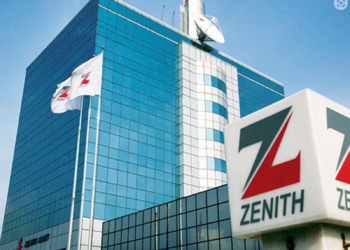Article summary
- Quoted Nigerian banks on the Nigerian Exchange (NGX) grew their e-business income by 7% to N307.472 billion compared to N287.429 billion recorded in the previous year 2021.
- UBA accounted for 25.68 % of the total e-business income realized by the eleven banks.
- To remain competitive, banks will need to focus on improving their technology infrastructure and developing new digital products and services.
Eleven Nigerian banks listed on the Nigerian Exchange collectively earned N307.472 billion from electronic-business transactions in 2022.
This signifies a 7% growth in e-business income compared to the previous year’s figure of N287.429 billion.
Based on figures obtained from the banks’ audited FY 2022 financial reports, United Bank for Africa Plc (UBA) and Access Holdings Plc earned the most from the electronic business during the year under review.
What you should know
E-business income encompasses revenue generated through electronic channels, card products, mobile applications, USSD channels, automated teller machines (ATMs), agency banking, internet banking, and point of sale (POS) payments.
The financial services sector is experiencing rapid transformation due to the disruptive and innovative influence of fintech. The availability of financial services at the tap of a button, accessible to anyone with an Internet-enabled phone, has led to increased participation of a significant number of Nigerians in the digital economy.
This has given rise to new business opportunities that were previously unfeasible. The surge in fintech adoption has resulted in substantial growth in transaction volumes within the financial services sector and subsequent economic benefits.
Moreover, the entry of telecom companies into the financial services sector has allowed them to leverage their existing infrastructure, particularly in rural areas, to enhance the delivery of important financial services. This development has further propelled the expansion of digital financial services.
In response to these trends, the banks have shifted their focus from traditional over-the-counter transactions to electronic payment systems, which has increased their revenue in terms of commissions. By reducing the need for extensive human resources to serve customers in person, the banks have experienced a surge in non-interest income through commissions and fees.
Breakdown of the banks’ e-income earnings
An analysis of financial statements of the listed banks, compiled by Nairametrics, revealed that tier-1 banks such as UBA, Access Bank, and Zenith Bank led topped the list with their e-income earnings last year.
These banks collectively recorded a pre-tax profit of N1.035 trillion, representing a 3% increase from the N998 billion posted in the previous year, FY 2021.
Below is a breakdown of the banks’ e-income earnings in 2022.
GTCO Holdings – N23.201 billion
GTCO Holdings reported an e-business income of N23.201 billion, representing an increase of 10.04%, compared to N21.083 billion generated in the equivalent period the previous year.
The holding company accounted for 7.55% of the total income generated by the twelve banks from electronic banking.
GTCO reported a profit before tax of N214.2 billion during its 2022 financial year, representing a 3.3% dip from N221.5 billion posted in the corresponding year ended December 2021.
According to the financial institution, the Group reported a net interest income of 30 billion for the year 2022 as against N220.61 billion posted in 2021 representing a growth of 17.54%.
The Group’s loan book increased by 4.6% from N1.80 trillion as of December 2021 to N1.89 trillion in December 2022, while deposit liabilities grew by 11.6% from N4.13 trillion to N4.61 trillion during the same period.
The Group’s balance sheet remains resilient with total assets and shareholders’ funds closing at N6.45 trillion and N931.1 billion, respectively. Capital Adequacy Ratio (CAR) remained very strong, closing at 24.1%.
Zenith Bank – N45.739 billion
Zenith Bank Plc posted an e-business income of N45.739 billion during the full year of 2022, an increase of 30.07% compared to N37.470 billion recorded in the corresponding period of 2021.
The most capitalized bank on the NGX accounted for 14.88% of the total e-business income of the eleven banks.
Zenith Bank Plc grew its gross earnings by 24% from N765.6 billion as of the end of the 2021 financial period to N945.5 billion in the corresponding period of 2022.
As part of its commitment to shareholders, the bank also announced a proposed final dividend payout of N2.90 per share, bringing the total dividend to N3.20 per share.
According to the audited financial results for the 2022 financial year presented to the Nigerian Exchange, the double-digit growth in gross earnings was driven by a 26% year-on-year growth in interest income from N427.6 billion to N540.2 billion and a 23% year-on-year growth in non-interest income from N309 billion to N381 billion.
Profits before tax also grew by 2% from N280.4 billion to N284.7 billion in the current year. The increase in profit before tax was due to the significant growth in all the income lines.
FBNH– N55.099 billion
First Bank’s e-business revenue declined by 2.26% in the full year of 2022 to stand at N55.099 billion from N56.375 billion recorded in 2021.
However, the bank’s e-business income accounted for 17.92% of the e-business revenue captured.
The Group’s Gross Earnings were up 6.32% to N805.128 billion from N757.296 billion posted in 2021, driven by strong growth in interest income.
Profit before Tax dropped by 5.26% to N157.902 billion as against N166.662 billion posted in 2021.
According to the bank in a statement, Net Interest Income rose by 59.15% to N363.249 billion from N228.242 billion in 2021.
FBN Holdings’ Operating Expenses grew by 23.35% to N218.481 billion from N177.130 billion in 2021.
Access Holdings – N59.653 billion
Access Holdings Plc, which is the largest commercial bank in the country, generated N59.653 billion from its electronic business, accounting for 19.40% of the total amount generated by the eleven banks under consideration.
Its e-business income dropped by 9.99% year-on-year compared to N66.280 billion recorded in the previous year.
According to the results presented on the floor of the Nigerian Exchange Limited (NGX), the bank reported N15 trillion in total assets, representing an increase of 28% from N11.73 trillion reported in the corresponding period of 2021.
The Group’s gross earnings rose by 43% to hit N1.388 trillion, as against the N971.9 billion it recorded the previous year, while interest income was up by 19% to N359.4 billion from N301.5 billion recorded in 2021.
Additionally, deposits from its customers increased to N9.25 trillion, higher than N6.955 trillion in 2021, while loans and advances to customers also went up to N5.557 trillion, from N4.446 trillion as of the full year, of 2021.
The management, however, proposed a final dividend of N46.21 billion, representing N1.30 per share to its shareholders for the year ended December 31, 2022.
However, the Group’s profit before tax declined by 5.1% from N176.8 billion in 2021 to N167.7 billion in 2022.
UBA – N78.946 billion
The Pan African bank recorded a sum of N78.946 billion as e-business income during the full year of 2022, an increase of 22.21% compared to N64.595 billion recorded in FY 2021.
The bank accounted for 25.68 % of the total e-business income realized by the eleven banks.
The 2022 financials, filed by the bank on the floor of the Nigerian Exchange Limited (NGX), showed that despite the highly challenging global economic and business environment, UBA recorded a laudable profit before tax, with a 31.2% growth, to close the year under review at N200.8 billion, rising from the N153.01 billion recorded at the end of the 2021 financial year.
Its profit after tax (PAT) grew by 43.5% to N170.2 billion in 2022, compared to N118.7 billion recorded the year before. Consequently, UBA Group Shareholders’ Funds rose to N922.1 billion, as of December 2022, achieving an impressive growth of 14.6% compared to the prior year.
The results showed that the bank’s gross earnings rose significantly to N853.2 billion, from N660.2 billion recorded at the end of the 2021 financial year, representing a strong 29.2% growth.
Total assets rose remarkably by 27.2%, crossing the N10 trillion mark, to close at N10.9 trillion in December 2022, up from N8.5 trillion in 2021.
According to the statement, this was a significant achievement and milestone in the history of the powerhouse financial institution.
In the year under consideration, UBA Group’s cost-to-income ratio dropped to 59.2%, from over 60% in the prior year, pointing to the Group’s improving efficiency.
Others include
- FCMB – N13.997 billion
- Union Bank – N7.971 billion
- Sterling Bank – N7.157 billion
- Wema Bank – N6.135 billion
- Unity Bank- N3.963
- Stanbic IBTC – N2.513 billion
What you should know
With the advent of technology, fintech firms and telecommunication companies with payment licenses are expected to pose a significant threat to traditional banks in Nigeria. Banks will have to adapt to these changes by developing new products and services, improving customer experience, and investing in technology to remain competitive.
To remain competitive, banks will need to focus on improving their technology infrastructure, developing new digital products and services, and enhancing their online and mobile banking capabilities. They will also need to invest in cybersecurity to protect their customers’ data.


















